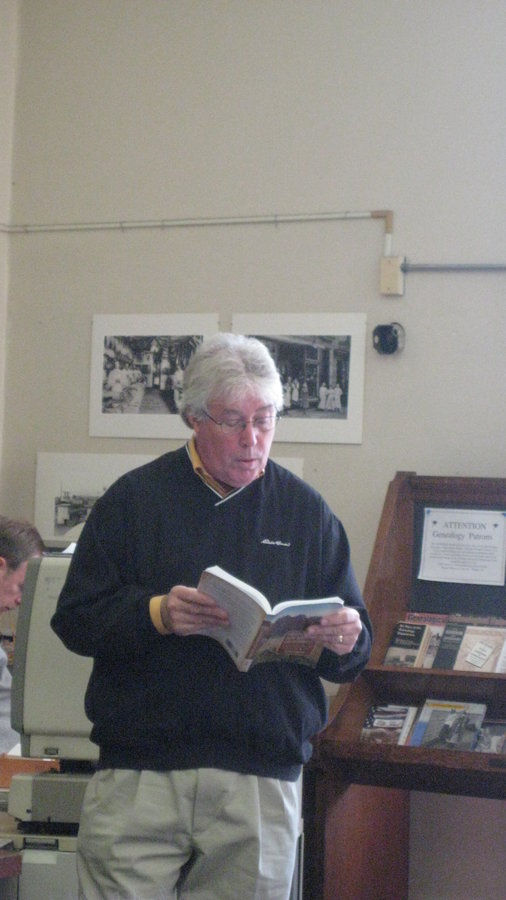Growing up as a boy in Jersey City, writer Thomas Belton remembers playing baseball with his brother Jack near Garfield Avenue. He also remembers the ore-colored fluid that would puddle and pool in low-lying areas of their community, including near the ball fields where they spent their free time.
It was only years later that Belton and other residents learned that the yellowish fluid was toxic chromium, one of the legacies of Jersey City’s past as an industrial hub.
“I’ll never forget, we used to play with the Police Athletic League,” Belton recalled. “And we’d play right alongside a poison that would later be linked to cancer.”
‘You’ll see people with their fishing poles out and they’ll be standing next to the DEP sign telling them not to fish.’ – Thomas Belton
____________
The portion of the book he read on Dec. 3 dealt specifically with Jersey City’s metal industry.
“The book starts out dealing primarily with human issues and exposure issues, but ultimately discusses all of the New Jersey’s different ecosystems,” he said.
On the front lines
Through his work at the DEP, Benton, who now lives in South Jersey, has been on the front lines of many high-profile environmental debates.
He said he was “attacked” by the media and some health advocates years ago for advising the state to warn pregnant women to avoid fish.
“This was at a time when, as a country, we were trying to get people to eat more fish, and it was widely accepted that fish is good for people,” said Benton. “Then here we come along and say that fish may not be good for some people, namely pregnant women.”
The health advisory warning pregnant women to avoid fish, because of its high mercury content, is now a national standard that continues to this day.
Benton was also part of the DEP push to get people to avoid fishing in the Hudson River, a river he and his brother often fished in with their father when they were growing up.
“It has turned out to be very hard to get people to stop fishing in the Hudson,” said Benton. “You’ll see people with their fishing poles out and they’ll be standing next to the DEP sign telling them not to fish.”
New Jersey: Ahead of the environmental cleanup curve
Despite New Jersey’s past problems with environmental pollution, Benton noted that the state has actually also been at the forefront of some of the most progressive and forward thinking environmental protection laws to be passed.
“It was New Jersey that first passed the water standards that ultimately became the Clean Water Act,” Benton told the Reporter after the reading. “New Jersey passed those water standards several years before the federal government did…Former New Jersey Sen. Bob Torricelli was the one who got Washington to pass the Superfund Act, which created federal resources for environmental clean-ups of old hazardous sites.”
Today, chromium cleanup is still proceeding in the city at a site on Garfield Avenue.
Residents who attended Benton’s reading, and who participated in the discussion that followed, said it shed light on the situation.
“I’m interested in environmental issues,” said Chuck Henry, who moved to Jersey City three months ago. “My wife is a writer and recently covered an update meeting on the chromium cleanup that’s going on. So, came here to learn more about it. I thought it was very interesting because a lot of this stuff he was talking about where things I wasn’t really aware of.”
Jersey City native Bruce Brandt, a library volunteer, said he found the discussion of interest.
“You know, sometimes you forget how bad the pollution really was here, and how far we’ve come,” Sipio said. “I remember playing baseball on some of this ball fields he mentions in his book. And I also used to fish in the Hudson. A lot of people did it. I don’t do it now, of course…But the things he was talking about are important ’cause we don’t want it to get like that again.”
The paperback edition of “Protecting New Jersey’s Environment: From Cancer Alley to the New Garden State (Rivergate Books, 2010), can be purchased through Amazon.com for $17.60.
E-mail E. Assata Wright at awright@hudsonreporter.com.
